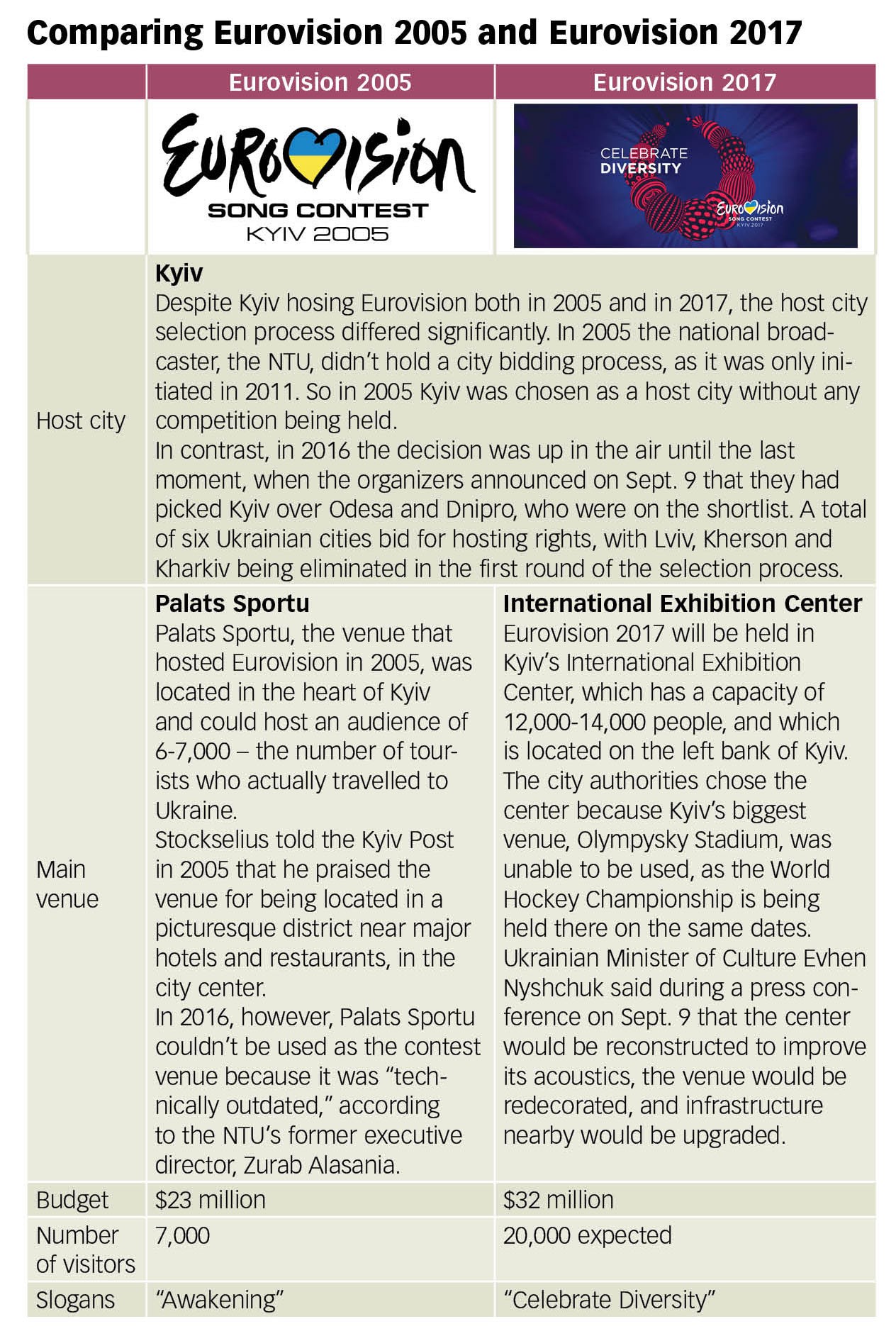Those fretting over delays and hiccups in Kyiv’s preparations for the 2017 Eurovision Song Contest should take heart. In 2005, when Kyiv last hosted the contest, things were even worse at this stage. Amid the political turmoil caused by the Orange Revolution that brought President Viktor Yushchenko to power, Kyiv was in danger of losing its right to host the event.
Kyiv first won the right to host Eurovision after Ukrainian singer Ruslana Lyzhychko won the 2004 contest with her song “Wild Dances.”
But the contest almost didn’t happen in Kyiv. The Eurovision Song Contest’s then-head, Svante Stockselius, visiting the Ukrainian capital in February 2005, found that preparations were seriously behind schedule. The public broadcaster had signed just one contract out of 125 needed for preparation.
The contract with Palats Sportu, the venue for the event, wasn’t signed until March.
Stockselius came to Kyiv only a month after the Orange Revolution that overturned the 2004 presidential election rigged for Viktor Yanukovych, who headed the organization committee until Feb. 17, 2005. He went on to become president in 2010 before fleeing in 2014 after his corrupt, authoritarian rule inspired the EuroMaidan Revolution.
According to Eurovision’s official website, Stockselius warned the public broadcaster and Yushchenko that the European Broadcasting Union, the official TV broadcaster of the event, would move Eurovision to another country. He gave Ukraine a tight two-week deadline to get its act together.
Swift action
The warning worked. When Stockselius returned two weeks later, he found that “all the conditions were met,” according to the Eurovision website.
However, Ukraine still had problems to overcome.
In February, politician and former lawmaker Taras Stetskiv was appointed as a head of the national television company. Pavlo Hrytsak was made the executive producer of the Eurovision event. Hrytsak is also managing the 2017 contest.
“The biggest problem was the lack of time,” Stetskiv told the Kyiv Post of the 2005 problems. “We only had two months to prepare everything. But the parliament and government agreed to hold all the tenders over 10 days instead of 45 – otherwise we wouldn’t have made it on time.”
Hrytsak told the Kyiv Post in January 2005 that Kyiv then had only 3,000 hotel rooms. In the end, however, the capital had enough places. According to state statistics, the contest attracted only 7,000 visitors.
On May 2005, less than a month before the Eurovision contest final, Ukraine also lifted visa restrictions on citizens of many Western nations.
“Despite the delays to the organization of the contest, the 2005 Eurovision Song Contest was a success for the national television company of Ukraine,” the Eurovision website says.
Challenges again
Ahead of this year’s event, the national television company admits that the preparations are again behind schedule.
The contest coincided with the reform of the state broadcaster into a public broadcaster. The public broadcaster was promised 0.2 percent of the state budget, but most of that money was allocated to Eurovision.
Part of the organizational team for the event quit on Feb. 13 amid a conflict with the broadcaster, which ex-Eurovision employees accused of non-transparency in making key decisions.
Hrytsak said at a Feb. 13 press conference while delays have taken place, the national television company has already signed 30 contracts and launched tenders for constructing the stage and for video production, and has started the accreditation of guests and journalists.
Oleksandr Kharebin, one of the executive producers who quit on Feb. 13, claims that the national television company had signed only those contracts that were prepared by his team and submitted to Hrytsak in December. He also said that management of the channel had decided to count the $7.4 million in expected revenues from advertising, sponsorship and tickets sales as expenses, effectively raising the current Eurovision budget by a third, to $32 million.
Hrytsak said that, despite the resignations, the preparations will be finished on time.
On Feb. 20, the national television company announced that Kirill Voronin would take over as Eurovision’s event manager, replacing Denys Bloshchynsky. He also named Oleg Zapadnyuk as head of security and Larysa Koval as as commercial director with the departure of Iryna Asman.
Show will go on
Ukrainian singer Ruslana, who brought Eurovision 2005 to Kyiv, believes that the 2017 contest will be a success.
In a statement on Feb. 17, she praised Hrytsak’s professionalism, saying that he had organized a contest that was “praised not only by the European organizers, but also by the thousands of foreign tourists and journalists who visited Kyiv in 2005.”
She said that Ukraine has sufficient finances and human resources to stage the event.
“I can guarantee that despite the complexity of the above-mentioned changes, Eurovision will be organized and held at the top level in Ukraine,” Ruslana said. “I encourage all the skeptics to visit Ukraine in three months and see for themselves how unwarranted their doubts were.”
Eurovision Song Contest will be held in Kyiv on May 9, 11 and 13 in the International Exhibition Center (15 Brovarskiy Ave.) on the left bank.
Tickets to the Grand Final that will take place on May 13 cost Hr 1,000 – 15,999 (€ 34 – 553).
Tickets for semi-final are available at www.concert.ua for Hr 766 – 9794 (€27 – 345).

